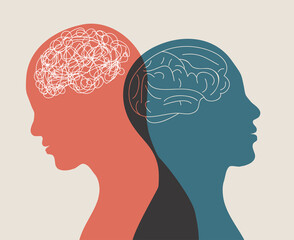Mental health struggles can interfere with everyday functioning. Get treatment early.
It’s important to understand that mental illness is not a reflection of your character, intelligence, or upbringing. It’s a treatable disease that can be managed with medication, therapy, and hope. This hope can come from a variety of sources, including family, friends, and faith. Visit Our Website if you need support.

Depression
Depression is more than just feeling sad or going through a tough time. It is a mental health disorder that requires understanding, diagnosis, and professional treatment. Depression can cause many symptoms, including feeling down most of the time or having thoughts about suicide. It is a real illness, and it affects people of all races and backgrounds.
Depression can be a struggle for families as well. It may be hard to talk about and can lead to feelings of shame or guilt. It can also have a financial impact, as some treatments are expensive and insurance coverage is limited. Family members can become exhausted trying to find help for a loved one and may need to take time off work to care for them. Some families may even be forced to move to get better care.
Some people may find it easier to seek help than others, depending on the situation. For example, people from lower-income communities are less likely to get the care they need. This is because of a lack of resources, language barriers, and cultural stigmas. It can be particularly difficult for people of color to receive treatment, with black and Hispanic people being the least likely racial groups to access services, according to a report.
It’s important to recognize the warning signs of depression and reach out for help as soon as possible. This includes seeking a doctor who specializes in depression and being willing to try several different treatments. Medications are available for treating depression and are often effective, especially when combined with psychotherapy.
It’s also important to remember that depression is not a character flaw or a sign of weakness. It is a medical condition that affects our moods and can interfere with our ability to function. It can be treated, but it takes a lot of effort to seek help. The earlier the treatment starts, the more effective it is. Almost everyone who gets treated for depression experiences relief from their symptoms. Depression is the most treatable of all mental health disorders.
Anxiety
People with anxiety disorders experience intense feelings of fear, terror, and panic in everyday situations. These feelings are often irrational and out of proportion to the actual danger, but they can prevent people from functioning normally. They can also interfere with relationships, work, and other life activities. In one country, an estimated 1 in 8 people live with a mental health condition, including anxiety disorders. As the COVID-19 pandemic continues, the number of those suffering from these disorders is rising.
A mental health professional can diagnose anxiety disorders based on symptoms and their effect on your life. They will perform a physical examination and discuss how your symptoms affect your daily life. They may run a few lab tests to rule out medical problems that can cause similar symptoms. They will also look at your reported symptoms and compare them to the criteria for anxiety disorders.
Anxiety disorders can be hard to treat, but there are many options available to help you manage your symptoms. Psychotherapy, or talk therapy, is one of the most effective treatments for anxiety disorders. It can help you change the negative thoughts and feelings that contribute to your anxiety, and teach you skills to relax in situations that make you anxious.
Cognitive behavioral therapy (CBT) and applied relaxation are two types of psychotherapy that can help you reduce your anxiety levels. You can get CBT from your GP or through mental health services.
You might be able to find self-help materials or online therapy for anxiety, but if you’re not making progress, ask your GP about getting a referral to a psychologist or psychiatrist. They can offer cognitive behavioral therapy or other talking therapies, or prescribe medication to manage your symptoms.
There are a few things that can increase your risk of developing an anxiety disorder, including childhood adversity and stressful life events like loss or illness in yourself or other family members. Certain personality traits, such as proneness to depression and high levels of perfectionism, can also increase your risk. Other risk factors include a history of substance misuse or withdrawal and having blood relatives with anxiety disorders.
Schizophrenia
A mental illness known as schizophrenia is a serious condition that affects how the brain functions. It can cause hallucinations (hearing or seeing things that aren’t there), delusions (believing something is true when it isn’t), and trouble with thinking clearly. This can make it hard to keep a job, find joy in life, and maintain healthy relationships. People with schizophrenia are often stigmatized by others who don’t understand the condition, and they may experience a lot of distress and anxiety.
While there’s no single physical test to diagnose schizophrenia, healthcare providers use a combination of factors including the person’s symptoms, how they’ve been affecting them, and whether they’re due to other causes, such as a brain tumor or another medical condition. They also consider how the person’s symptoms have changed over six months.
In addition to medication, psychosocial treatments, such as individual therapy and family psychotherapy, can help reduce the severity of schizophrenia’s negative effects. These treatments can also teach people to manage their symptoms better, reducing the chance that they’ll get worse and need to be hospitalized.
For example, if someone with schizophrenia notices that their thoughts are jumping from one topic to another and their words are getting jumbled together, this is a warning sign that they need help. They should contact their healthcare provider right away.
Most people with schizophrenia don’t commit violent crimes, but they do have a higher risk of self-harm and suicide than the general population. Symptoms can include feeling uneasy and paranoid, being unable to express emotions, and difficulty making or keeping friends. It’s important to take any concerns about a loved one’s behavior seriously and get them the medical care they need as soon as possible.
Many people with schizophrenia can live productive lives if their symptoms are well-managed. Treatment includes antipsychotic medications, psychotherapy other types of psychological therapy, and lifestyle changes. For example, it’s important to eat well and exercise regularly. Taking steps to address substance misuse is also critical because it can make schizophrenia worse. Efforts to transfer care from mental hospitals to the community are important and should be accelerated.
Anger
Anger is a natural human emotion that can help motivate us to rectify injustices and make positive changes. However, when uncontrolled anger causes you to react in ways that are harmful to yourself and others, it can be a sign of a mental health issue that requires professional attention.
Anger can be expressed in many ways, from shouting matches and physical altercations to passive-aggressive behavior, sarcasm or even being silent. Some people even turn their anger inward, often harming themselves or shutting themselves off from other people. Anger problems can also be an indicator of other mental health issues, such as depression or anxiety disorders.
Sometimes, it is easier to transform feelings of vulnerability and powerlessness into anger than to face them directly. This can be particularly common in the aftermath of trauma. In this case, you may use anger as a way to distract yourself from the pain and fear that you feel by making you feel strong. Unfortunately, this will not solve the problem and may make it worse in the long run.
A good therapist will recognize when your anger is becoming a problem and will be able to provide you with the tools and support needed to manage it. Talk therapy will usually include learning about the root cause of your anger, as well as practicing different coping strategies. Anger management programs are another option and often combine talking therapy with relaxation techniques, improving communication skills, changing negative thought patterns, and problem-solving.
Anger management is a crucial part of your overall mental health and can benefit you in many ways, including reducing the impact it has on your physical health (e.g. heart disease, high blood pressure, digestive problems, and a weakened immune system) and your social relationships. It can also reduce your risk of self-harm and improve your ability to cope with stressful situations.
Unfortunately, there can be a stigma associated with seeking help for anger issues, which can make some people reluctant to seek treatment. However, a professional therapist will be able to provide a safe and supportive environment to explore the underlying causes of your anger, as well as offer you tools to better manage it.
